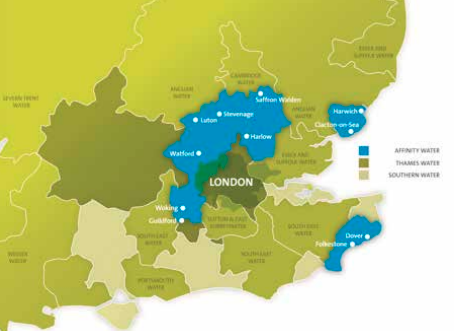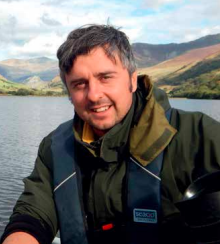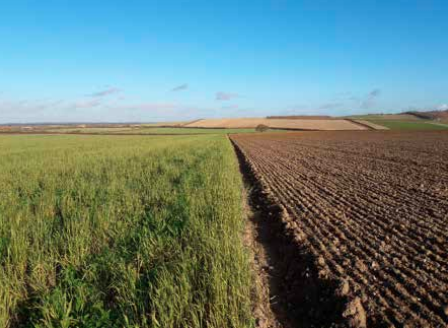
Soil and Water
Our population is growing and so is the demand for food, highlighting the importance of farming to us all. This growing population will also need more water, especially in the south-east of England. The company I work for, Affinity Water, supplies water in an area already under ‘serious water-stress’ so it is vital that we manage our water resources, from source to tap, in the most sustainable way possible.
The obvious, but often overlooked, fact about drinking water in the UK is that every drop has been sourced from the natural environment in which we all live. We must abstract water from an environment that is also being used for food production, industry and human habitation. In the UK, agriculture is the dominant land use in many of the catchments used for public water supply. Whether you farm on the banks of the Thames or the tops of the Downs; every piece of land, every farm in this country sits within a water catchment. Therefore, what happens on farm and in the field is of interest to us in the water industry and we want to help farmers make positive choices for their farm business and the water environment.

As a reader of Direct Driller you are clearly interested in soil health and value your most important asset, the soil. Improving soil health, although difficult to measure in metric terms, is something you are working towards and see value in. What impresses me about no-till farmers is not only the desire to improve soil health but also the innovative ways many of you are farming. Innovation such as reducing inputs, trialling companion cropping and introducing novel crops into your rotations are a few examples. Many of these innovations will contribute towards a sustainable, resilient farm business but can also help the water environment by reducing soil run-off and losses of inputs to water such as pesticides and nutrients. More research is needed to quantify these benefits to the water environment at a farm and catchment scale, particularly in a UK context, but the perceived wisdom is that healthy soil will lead to healthy water.

Affinity Water, like many other water companies in the UK, have a catchment management team who are working with farmers and other land managers to solve water quality challenges at source. I am sure you have heard of (or are even part of) one of the many water company metaldehyde schemes across the country. Working on metaldehyde reduction in catchments has been an important learning curve for us and has helped us get to know many farmers across our patch and find workable solutions to this problem. Another important aspect of our work is investigating what methods can be used on farm to reduce nitrate leaching to water. We have been investigating the effectiveness of cover crops at reducing nitrate leaching in our drinking water catchments. Cover crops are well known for capturing excess nitrate in the soil but also have many other benefits to the soil and the wider environment. The trial, now into its third year, has tested different cover crop mixes to assess not only the benefits to the soil but also how much nitrate is captured by the cover Crop.
The results are promising and has confirmed to us that cover crops are effective at capturing nitrate. So convinced are we by the benefits of cover cropping that we are planning to incentivise farmers to grow cover crops in areas where we have a nitrate leaching problem.

The soil is the interface between the rain that falls from the sky and the rivers and groundwaters that rely on rainfall for their function. As an industry we are completely reliant on rainfall. We can’t affect how much water falls from the sky but the next best thing we can influence is the soil that covers our catchments. It is generally acknowledged that notill soils have better water infiltration than a tilled soil so one would assume that if a greater area of arable land in our catchments was under no-till then we have greater potential for water recharge into our aquifers. This hypothesis needs to be tested and we are planning to research this topic over the coming years. I hope to continue to contribute articles to Direct Driller and will keep you informed of any developments in our research into soil health and the water environment. If you have any questions or ideas for our catchment management work I’d be happy to hear from you. E-mail: shaun.dowman@ affinitywater.co.uk.
